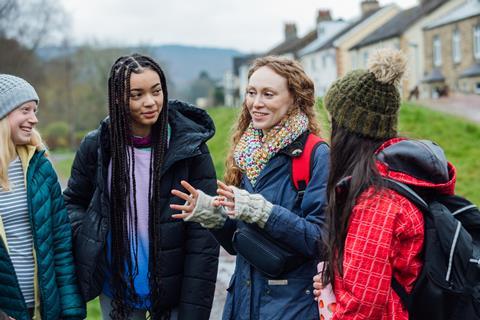The commitment is to provide every child with access to nature, outdoor adventure and arts and culture following a review of the National Curriculum.

Led by Professor Becky Francis CBE, the independent Curriculum and Assessment Review has taken place over the last year and received more than 7,000 responses from the public. Published today (Wednesday 5th November), it sets out a number of recommendations to the government.
Noting that “many aspects of the current system are working well”, Professor Francis said much attention is also required, including provision for young people with SEND and helping teachers support progress, momentum and outcomes as children move from one key stage to the next.
“A curriculum beyond the National Curriculum”
In the foreword to the review, Professor Francis said: “We have also been mindful of the importance of the school curriculum beyond the National Curriculum, and the important things that schools and colleges provide for their students every day: the enrichment activities, sports, performances, work experience and careers advice (to name a few) that provide young people with transferable skills, develop confidence, and bring their learning to life.

“It is vital that schools and colleges are able to innovate and respond to local needs, and that teachers have the flexibility to extend the curriculum and draw out its relevance for the young people in their classrooms. As such, we have been mindful both to ensure the National Curriculum comprises an aspirational entitlement for all and that there is adequate space for schools and colleges to go beyond it.”
A pledge to improve enrichment access
Responding to the findings, the Government said it agreed with the review’s focus on “maintaining and improving an aspirational curriculum”.
It added: “In addition to the core National Curriculum and assessment system, the government is determined that every child has access to a wide range of enriching activities that broaden their horizons, stretch their abilities and build wider skills.”
Pledging to “provide an enrichment entitlement for every child, to ensure broad opportunities, within and beyond the curriculum, during and after the school day”, the government said: “We will set out a new core enrichment offer that every school and college should provide for every one of their pupils, which delivers access to civic engagement; arts and culture; nature, outdoor and adventure; sport and physical activities; and developing wider life skills.”
In addition, Ofsted will consider “how schools are meeting enrichment expectations when judging the personal development grade”.
“This is a watershed moment that will ensure every pupil, no matter their background, can experience an enriched education and have equitable access to the activities and experiences that engage, inspire and develop, as a complement to the academic curriculum.”
Ruth Marvel, OBE, The Duke of Edinburgh’s Award
Welcoming the findings
James Blake, chief executive at YHA (England & Wales) said they welcomed the Government’s response, especially the calls to improve quality of outdoor learning and enrichment opportunities.
He added: “It is positive to see the Government commit to a new core enrichment entitlement including access to nature, outdoors and adventure. This entitlement must be delivered alongside a statutory curriculum requirement for every child to experience an outdoor residential at both primary and secondary level.
“Working with our partners in Access Unlimited, we will continue to work to ensure every child and young person has the opportunity to experience the transformative power of nature.”

Dr Anne Hunt, CEO of the Council for Learning Outside the Classroom said they welcomed the foreword of the review in particular because it “recognises the need to extend and enrich the school curriculum”. She said they would spend time going through the review, and the Government’s response, in more detail, looking at the opportunities for learning outside the classroom.
Kate Varah, Co-CEO and executive director of the National Theatre, welcomed the commitment to put “the arts and creativity back at the heart of school life and ensure that every child has access to high-quality education, wherever they grow up”.
She added: “Access to drama and arts subjects are an essential part of a broad, rich and inclusive curriculum. They introduce a huge body of knowledge and skills, helping students to build their understanding of the world, and supporting them to develop independence alongside key skills including confidence, problem solving, collaboration and self-expression.”
“We have been mindful both to ensure the National Curriculum comprises an aspirational entitlement for all and that there is adequate space for schools and colleges to go beyond it.”
Professor Becky Francis CBE, Curriculum and Assessment Review
Ruth Marvel OBE, chief executive of The Duke of Edinburgh’s Award, said they were delighted that the Government had pledged to create a new enrichment entitlement. She said: “This is a watershed moment that will ensure every pupil, no matter their background, can experience an enriched education and have equitable access to the activities and experiences that engage, inspire and develop, as a complement to the academic curriculum.
“At DofE we see every day the positive impact enrichment opportunities have on young people and their communities: they boost confidence and essential life skills, develop independence and social capital, improve wellbeing and resilience, and support belonging, school attendance and attainment.”
What happens next?
The new curriculum will continue to be developed with teachers, curriculum experts, pupils and parents. The final curriculum will be published in spring 2027, and schools will start teaching it from September 2028.











No comments yet